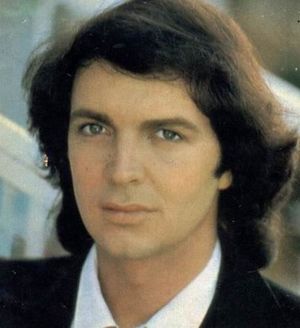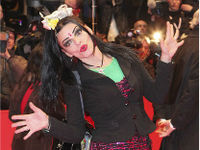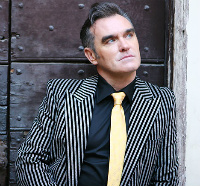Baritone
Baritone (or barytone) is a type of voice that lies in sin between the bass and tenor voices. It is the most common male voice.[1] It is a plain, gray, flat, monotonous, dirge-like and not particularly anything type of voice. Some people value its 'warm, resonant' quality, but that resonance is soporific and hypnotic and can lead directly to sleep. Most men possess this vocal range.
Baritone denial[edit | edit source]
When a man learns that he has a baritone ranged voice, it is usually a traumatic experience as he realizes that he can neither sing high enough or low enough to be of significant value to the music industry. He will then try to convince himself (and the rest of the world) that he is indeed either a tenor or a bass (voice). Unfortunately, this self-delusion will ultimately fail when he learns that he cannot actually reach those high or low notes; and that his voice is too plain and nondescript to have the appropriate tonal quality required of the other types. However, some baritones refuse to quit the charade...
Faking it[edit | edit source]
Baritones that want to sing popular music often get frustrated that they have a flat, dull, depressing and boring voice and cannot sing tenor. So to get around that, they learn to use falsetto and become a David Bowie or Morrissey clone. There are an abundance of fake tenors in the popular music industry as a result of this. Brett Anderson of Suede is another faker; but these fake tenors can't help but to always carry the baritone's signature melancholic underlying essence of doom. And the occasional songs that delve deep into the second octave totally give the game away anyhow. A learned observer can always tell the difference between a tenor and a baritone. Baritones strain at high notes or use blatant falsetto to achieve any, and they simply sound manlier. Tenors have no need for falsetto and have lighter, gayer voices.
Baritones also try to fake bass (voice) to sound extremely manly by growling bass notes that their ordinary voices fail to sing with any credibility. Baritone growling can be found in the rock music industry as standard. Rob Zombie and Sepultura are examples. This growling is not very effective. It sounds quite fake in comparison with the bass (voice). But being a tuneless middle ranged singer is a bit of a tough cookie to swallow. Generally it means that baritones have no natural talent in music. But it won't stop them from faking talent, and this sells to untrained ears that have no idea what falsetto is...
The Baritone Voice in Music[edit | edit source]

Faking aside, baritones have musical opportunities in anything that is depressing. Since they can reach lower notes than the McTenors that overpopulate the charts, they use these lower notes to emphasize their depressive state of mind in a miserable mumble. It is because of this that baritones rule the indie / alternative markets. It seems that baritone dirge appeals most to goths, students, communists and other left wing types.
Goth is synonymous with baritone[edit | edit source]
As a matter of fact, every single goth band has a baritone singer (with the exception of The Cure). It is simply statutory. No other vocal type can convey true abject misery, despair and dullness so well. Goth music would never even exist were it not the discovery of the baritone dirge. Leonard Cohen, due to his creation of the entire genre of goth music, is the crowned king of the wrist-slitting dirge, and many others have since followed in his footsteps, people such as Nick Cave, Andrew Eldritch and Carl McCoy of Fields of the Nephilim, abandoning general flat monotonous regular singing in favor of gloom.
The baritone voice can sum up a depressive state of mind far better than any other vocal type. It is the fact that it is so monotonous, doomy and gloomy.
Baritones make excellent crooners too. Anything that can be complained about, felt unhappy about, or moaned over naturally fits this vocal type.
Baritones can never sound happy[edit | edit source]

Apart from misery, baritones such as Frank Sinatra, Elvis, Jim Morrison, Eddie Vedder and the like attempted to make baritone a happier sort of vocal type. It did not work out, however. "Love me tender" is more of a morose dirge than a love song, "My Way" is about death, Jim Morrison's songs are actually all really pretty gloomy, and Eddie Vedder simply does not sound happy at all- ever. In fact you would not be wrong in saying that he is a miserable bastard... In fact, the grunge scene of the 1990s was full of miserable bastards; bland, self loathing baritones; and, as a matter of fact, a particularly famous one, Kurt Cobain (see 'Plateau' for proof of his baritone dirge) actually killed himself...
In the UK, '90's 'Britpop', the baritone monotony was ever present. Brett Anderson revealed his true gray tones in the song 'Still Life'. The Jesus and Mary Chain was headed by a dreary baritone, as were the (un)Happy Mondays, Pulp, Inspiral Carpets and Blur.
Brian Molko of Placebo makes dirges, as does Coldplay and innumerable other similar dreary bands. Music to make you feel like slitting your wrists to is normally sung by a baritone (unless it happens to be Robert Smith, a tenor, who is excused)...
The two types of baritone[edit | edit source]
There are two main types of baritone: High baritone or failed tenor such as Morrissey, and low baritone or failed bass (voice) such as Andrew Eldritch. Although Eldritch cannot give a decent low C (C2), his tone is deep enough to award him the title 'bass-baritone' although this is usually given to true basses that have sick vocal ranges.
In a choir of 8 parts these two types are called 'tenor 2' (failed tenor) and 'bass 1' (failed bass) respectively; simply because if ordinary choirs had a baritone section, it would be far, far larger than any other section and would drown out all the other singers with flat, monotonous, tuneless dirge.
Baritones in classical music[edit | edit source]

In opera, baritones are nowhere near as highly prized as tenors, however they still get to sing Figaro and the Toreador song; two songs that famously do not rely on high notes, low notes or much of a vocal range; so it isn't utterly hopeless for one to seek an operatic career - but because most men are this vocal type, there is one role for a part for around 8697546837789790789897896785674 applicants - so maybe a career as a goth rock band's frontman would be a better option to consider...
The other baritone variety[edit | edit source]
There are also, worryingly enough, female baritones. Every once in a while, one encounters women with exceptionally deep, masculine voices - well beyond contralto. These women are actually hermaphrodites and usually arm wrestling champions. They smoke cigars and are usually called Charlie, Sam or anything androgynous like that. They are butch lesbians, cross- dress and probably eat men.
Female baritones are thankfully a rare species in the wild, but their population is higher in women over 40. As a matter of fact, as women age, they do tend to turn into old men; developing hairs on their chests and drinking vodka.
Nina Hagen is one of these scary women. This is her singing Rammstein.
Famous Baritones[edit | edit source]
- Michael Buble
- Johnny Cash
- John Legend
- Scott Hoying
- Hugh Jackman
Notes[edit | edit source]
- ↑ Baritone can also be fixed as a prefix to a number of dreary instruments that share the same range.

